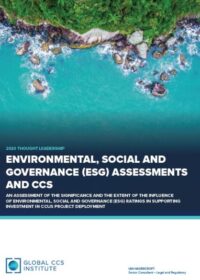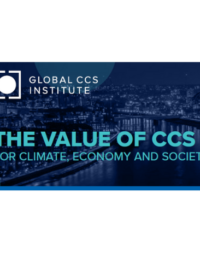リソース
刊行物、報告書および研究調査
検索条件
With the transition to a low-carbon economy steadily underway, CCS is becoming recognised as a tool that compliments the wide array of climate approaches being utilised to reach climate neutrality. The role of emission reductions and removals in the mitigation of climate change will change over time. It is widely agreed that emission reductions should be prioritised on the pathway to net zero. This, however, will change once net zero emissions are achieved; net zero is a point on the journey, not the final destination. Carbon removal will become the main driver of climate ambition in the second half of the century.
In this brief, Senior Policy Advisor with the Global CCS Institute, Eve Tamme, explains the dual role of CCS in climate change mitigation, and provides an overview of the two technological carbon removal approaches that use CCS: bioenergy with carbon capture and storage (BECCS) and direct air capture with carbon storage (DACCS). Along with highlighting the varied applications of CCS, this brief also includes a summary of ongoing challenges and opportunities tied to carbon removal related policy development.
Disclaimer
The content within the Global CCS Institute Publications, Reports and Research Library is provided for information purposes only. We make every effort and take reasonable care to keep the content of this section up-to-date and error-free. However, we make no claim as to its accuracy, currency or reliability.
Content and material featured within this section of our website includes reports and research published by third parties. The content and material may include opinions and recommendations of third parties that do not reflect those held by the Global CCS Institute.
「世界のCCSの動向 2020年版」政策決定者向ファクトシート日本語訳を、公開いたします。
こちらは、最新版「Gloal Status of CCS 2020」(邦題「世界のCCSの動向2020年版」)を、基に作成された、「Gloal Status of CCS 2020 - Policymkers Factsheet」の、日本版です。
政策決定者向ファクトシート日本語訳版はこちらです。
Disclaimer
The content within the Global CCS Institute Publications, Reports and Research Library is provided for information purposes only. We make every effort and take reasonable care to keep the content of this section up-to-date and error-free. However, we make no claim as to its accuracy, currency or reliability.
Content and material featured within this section of our website includes reports and research published by third parties. The content and material may include opinions and recommendations of third parties that do not reflect those held by the Global CCS Institute.
The Global Status of CCS Report 2020 demonstrates the vital role of carbon capture and storage technologies (CCS) in reducing emissions to net-zero by 2050 as well as documenting the current status and important milestones for the technology over the past 12 months.
The report provides detailed information on and analyses of the global CCS facility pipeline, international policy perspectives, CO2 storage and the CCS legal and regulatory environment.
In addition, four regional updates provide further detail about CCS progress across the Americas, Europe, Asia Pacific and the Gulf Cooperation Council States and a Technology section provides updates on key innovations and applications of CCS.
Disclaimer
The content within the Global CCS Institute Publications, Reports and Research Library is provided for information purposes only. We make every effort and take reasonable care to keep the content of this section up-to-date and error-free. However, we make no claim as to its accuracy, currency or reliability.
Content and material featured within this section of our website includes reports and research published by third parties. The content and material may include opinions and recommendations of third parties that do not reflect those held by the Global CCS Institute.
インスティテュート文献概要「Replacing 10% of NSW Natural Gas Supply with Clean Hydrogen: Comparison of Hydrogen Production Options」
17th November 2020
<インスティテュート文献概要>
文献:「Replacing 10% of NSW Natural Gas Supply with Clean Hydrogen: Comparison of Hydrogen Production Options」(邦題「豪州ニューサウスウェールズ州における天然ガス供給10%をクリーン水素に置き換える:水素生産オプションの比較」)
クリーン水素は、グリーン水素の場合は再生可能エネルギーを利用し、ブルー水素の場合はCCSと組み合わせて化石燃料を利用することのどちらかによって、生産されます。
クリーン水素の最も費用効果的な生産方法を見極める中で、Coal Innovation NSW(豪州ニューサウスウェールズ州石炭イノベーション:CINSW)は、ニューサウスウェールズ州における天然ガス供給の10%をクリーン水素に置き換えた場合の生産費用に関する調査をグローバルCCSインスティテュートに委託しました。
この調査は、ニューサウスウェールズ州のガス供給網において容量比で10% H2:90% CH4(天然ガス)ミックスを達成するために十分なクリーン水素を生産し、かつ現在天然ガスのみで供給されているのと同量の総エネルギーを供給するシナリオを検討しています。検討されたオプションは、天然ガス改良とCCSの組み合わせ、石炭ガス化とCCSの組み合わせ、及び、再生可能電力を利用した水の電気分解でした。調査の結果、ニューサウスウェールズ州においてクリーン水素を生産する最適オプションは、費用、規模、資源利用、排出量低減効果を考慮すると、CCSと組み合わせて石炭ないしガスを利用することでありました。
(参照:より詳細のニューサウスウェールズ州の資料はこちらへ))
See NSW Government for further information
原典はこちらからダウンロードできます。
Disclaimer
The content within the Global CCS Institute Publications, Reports and Research Library is provided for information purposes only. We make every effort and take reasonable care to keep the content of this section up-to-date and error-free. However, we make no claim as to its accuracy, currency or reliability.
Content and material featured within this section of our website includes reports and research published by third parties. The content and material may include opinions and recommendations of third parties that do not reflect those held by the Global CCS Institute.
Ahead of the 2020 G20 summit, the Global CCS Institute was asked to contribute to the Circular Carbon Economy (CCE) Guide, organised by KAPSARC. In a report titled 'Remove: Carbon Capture and Storage', Alex Zapantis assesses the value of CCS as an effective climate mitigating technology that aims to remove CO2 from the atmosphere and support the establishment of a circular carbon economy.
The report was discussed during a live webinar hosted by KAPSARC.
To read the report in full, click download below.
Disclaimer
The content within the Global CCS Institute Publications, Reports and Research Library is provided for information purposes only. We make every effort and take reasonable care to keep the content of this section up-to-date and error-free. However, we make no claim as to its accuracy, currency or reliability.
Content and material featured within this section of our website includes reports and research published by third parties. The content and material may include opinions and recommendations of third parties that do not reflect those held by the Global CCS Institute.
At the request of the US Department of Energy, The Global CCS Institute undertook an examination of the significance and the extent of the influence of Environmental, Social and Governance (ESG) ratings in supporting investment in CCS project deployment.
The objective of this study was to consider the following five questions:
- How does a company’s ESG rating impact the company?
- How does a company’s CO2 footprint or exposure impact its ESG rating?
- How is CCS considered when the ESG performance of a company with a large CO2 footprint or exposure is rated?
- Do the positive impacts of CCS (if any) on a company’s ESG rating support the business case for investing in or financing CCS?
- How does climate litigation and public policy impact corporate risk and ESG ratings?
The resulting assessment addressed each of these questions, to provide a clearer picture of the complex relationship between the development and scope of ESG ratings, the impacts of a company’s ESG performance and ultimately, whether this will influence future investment in CCS.
Disclaimer
The content within the Global CCS Institute Publications, Reports and Research Library is provided for information purposes only. We make every effort and take reasonable care to keep the content of this section up-to-date and error-free. However, we make no claim as to its accuracy, currency or reliability.
Content and material featured within this section of our website includes reports and research published by third parties. The content and material may include opinions and recommendations of third parties that do not reflect those held by the Global CCS Institute.
講演資料:Japan-Asia CCUS Forum 2020 (2020年10月6日開催 )Presentations for Japan-Asia CCUS Forum 2020 (6th October 2020)
6th October 2020
English descriptions follow Japanese.
2020年10月6日(木)に、「Japan-Asia CCUS Forum 2020」(日本CCS調査株式会社共催)を開催いたしました。この度は、多数のご参加を頂き、有難うございました。講演資料並びに、録画は、こちらよりご覧ください → リンク
Thank you very much for your participation to "Japan-Asia CCUS Forum 2020" (Japan CCS Co. Ltd. as co-host )was held on 6 October. Presentations & video recordings of the forum are now available here → Link
Disclaimer
The content within the Global CCS Institute Publications, Reports and Research Library is provided for information purposes only. We make every effort and take reasonable care to keep the content of this section up-to-date and error-free. However, we make no claim as to its accuracy, currency or reliability.
Content and material featured within this section of our website includes reports and research published by third parties. The content and material may include opinions and recommendations of third parties that do not reflect those held by the Global CCS Institute.
Over the past year, the outlook for CCS has been positive, particularly in the United States (US). Thanks to broad bipartisan support at both the federal and state level, CCS in the US has seen growth exceeding that of any other nation.
Additionally, the Institute has seen an increase in new stakeholders looking to engage and explore the role of CCS in their emissions reduction strategies. These new stakeholders include sustainable investors who believe CCS projects can deliver strong returns while achieving environmental goals and mitigating climate change risk.
These new market entrants, however, often share a common concern; the need to de-risk CCS for investment.
This briefing will serve to summarise ongoing work by the Institute to communicate and educate stakeholders on the potential risk characteristics of CCS and to discuss these in the context of de-risking CCS investments and addressing challenges from a US perspective.
Disclaimer
The content within the Global CCS Institute Publications, Reports and Research Library is provided for information purposes only. We make every effort and take reasonable care to keep the content of this section up-to-date and error-free. However, we make no claim as to its accuracy, currency or reliability.
Content and material featured within this section of our website includes reports and research published by third parties. The content and material may include opinions and recommendations of third parties that do not reflect those held by the Global CCS Institute.
In a report co-authored by Columbia University’s Centre on Global Energy Policy (CGEP) and the Global CCS Institute titled ‘Net Zero and Geospheric Return: Actions today for 2030’, findings reveal that climate finance policies and the development of carbon dioxide removal technologies need to grow rapidly within the next 10 years in order to curb climate change and hit net-zero targets.
The report unveils several additional key findings and recommendations to avoid climate catastrophe:
- With 2020 set to close the hottest decade on record, CO2 emissions need to drop by 50% to achieve net-zero climate goals by 2030
- The rapid deployment of climate mitigating infrastructure needs to occur, including the expansion of CO2 pipelines from the current 8,000 km to 43,000 km by 2030
- Clear climate polices which reduce the financial and regulatory risk of CO2 capture and storage and increase CO2 storage options need to be quickly developed and implemented
Download the full report for more.
Disclaimer
The content within the Global CCS Institute Publications, Reports and Research Library is provided for information purposes only. We make every effort and take reasonable care to keep the content of this section up-to-date and error-free. However, we make no claim as to its accuracy, currency or reliability.
Content and material featured within this section of our website includes reports and research published by third parties. The content and material may include opinions and recommendations of third parties that do not reflect those held by the Global CCS Institute.
The Value of Carbon Capture and Storage (CCS) thought leadership report evaluates the benefits of large-scale investment and deployment of CCS projects, both through an economic and climate change mitigation lens.
This newly released factsheet highlights the key components of the report including:
- The deep decarbonisation of hard-to-abate industrial sectors through the use of CCS technologies
- Widespread job creation tied to CCS deployment
- The delivery of innovation led economic growth
Download the factsheet below and have a quick look at our video for more highlights on the value of CCS.
To read the full Value of CCS thought leadership report, click here.
Disclaimer
The content within the Global CCS Institute Publications, Reports and Research Library is provided for information purposes only. We make every effort and take reasonable care to keep the content of this section up-to-date and error-free. However, we make no claim as to its accuracy, currency or reliability.
Content and material featured within this section of our website includes reports and research published by third parties. The content and material may include opinions and recommendations of third parties that do not reflect those held by the Global CCS Institute.
グローバルCCSインスティテュート日本事務所主催「なぜ世界はCCSが必要なのか? - 世界のCCSの動向とその課題」へ、多くのご参加を賜り有難うございましtあ。本会合の録画および、講演資料はこちらをご覧ください→ リンク
Disclaimer
The content within the Global CCS Institute Publications, Reports and Research Library is provided for information purposes only. We make every effort and take reasonable care to keep the content of this section up-to-date and error-free. However, we make no claim as to its accuracy, currency or reliability.
Content and material featured within this section of our website includes reports and research published by third parties. The content and material may include opinions and recommendations of third parties that do not reflect those held by the Global CCS Institute.
Organisation(s): Global CCS Institute, Pale Blue Dot
Topic(s): CO2 storage
The CO2 Storage Resource Catalogue is a pioneering initiative to accelerate the deployment of carbon capture, utilization and storage (CCS) by supporting the consistent evaluation of storage resources.
This report, authored by Pale Blue Dot Energy, details the findings of the first assessment for CO2 Storage Resource Catalogue.
Disclaimer
The content within the Global CCS Institute Publications, Reports and Research Library is provided for information purposes only. We make every effort and take reasonable care to keep the content of this section up-to-date and error-free. However, we make no claim as to its accuracy, currency or reliability.
Content and material featured within this section of our website includes reports and research published by third parties. The content and material may include opinions and recommendations of third parties that do not reflect those held by the Global CCS Institute.







